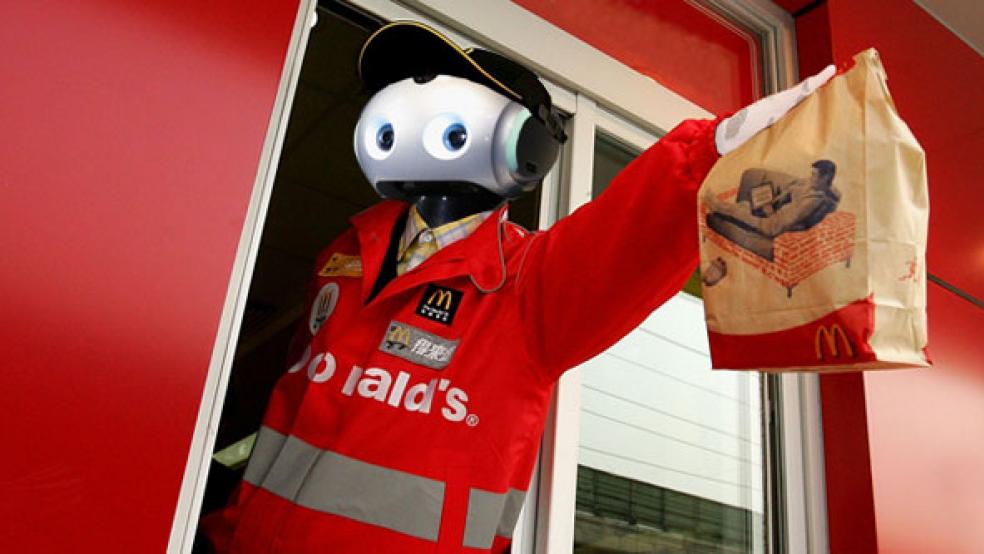Millions of people hold low-wage, often part-time jobs in the fast food industry. Historically, low wages, few benefits and a high turnover rate have helped to make fast food openings relatively abundant. These jobs, together with other low-skill positions in retail, provide a kind of safety net for workers with few other options.
In the current economic environment, these jobs are, of course, much harder to get. McDonald's recent high-profile initiative to hire 50,000 new workers resulted in over a million applications -- numbers that give McDonald's a lower acceptance rate than Harvard.
What about the future? Most forecasts assume that the fast food industry will continue to be a significant job creator. The Bureau of Labor Statistics ranks food preparation as one of the top four fastest-growing occupations, and that trend is expected to continue at least through 2018.
Is it possible that these projections miss the impact of technology? Could these jobs begin to disappear? For some insight into what could potentially happen, consider this article from The New York Times about the Kura sushi chain in Japan:
Efficiency is paramount at Kura: absent are the traditional sushi chefs and their painstaking attention to detail. In their place are sushi-making robots and an emphasis on efficiency.
Absent, too, are flocks of waiters. They have been largely replaced by conveyors belts that carry sushi to diners and remote managers who monitor Kura's 262 restaurants from three control centers across Japan. ("We see gaps of over a meter between your sushi plates -- please fix," a manager said recently by telephone to a Kura restaurant 10 miles away.)
Absent, too, are the exorbitant prices of conventional sushi restaurants. At a Kura, a sushi plate goes for 100 yen, or about $1.22.
Such measures are helping Kura stay afloat even though the country's once-profligate diners have tightened their belts in response to two decades of little economic growth and stagnant wages.
McDonald's has already announced plans to install touch-screen ordering systems in over 7000 European locations. To me, it is not difficult to imagine many of the ideas being utilized at Kura eventually being deployed throughout the fast food and beverage industries. If automated preparation and off-site store management work for sushi, then why not for burgers or lattes?
One important thing to take away from the sushi story is the way in which a stagnant economy can be a driving force behind increased automation. Almost any type of restaurant food is a discretionary purchase: if the price is too high, people can and will refuse to buy. That presents a real problem if -- as is the case now -- businesses are seeing significant increases in the price of the food commodities they must purchase. For a business that is squeezed between rising input prices and tepid demand, investment in labor-saving technology can represent one of the few viable paths to continued profitability.
Increased automation in fast food and beverage providers is likely to someday offer increased convenience, speed, and ordering accuracy. Robotic food preparation could also be viewed as more hygienic as fewer workers come into contact with food. And of course, price will ultimately be the determining factor. As one Kura sushi customer quoted by The Times notes: "It's such a bargain at 100 yen," ... "A real sushi restaurant?" he said. "I hardly go anymore."
If jobs in the fast food industry start to disappear, or even if the rate of job growth slows significantly, the implications for the workers that depend on these jobs of last resort will be dire. There may be few other alternatives for workers at that skill level, especially since other low-wage retail jobs may be similarly threatened.
Martin Ford is the author of The Lights in the Tunnel: Automation, Accelerating Technology and the Economy of the Future (available from Amazon or as a PDF download) and has a blog at econfuture.wordpress.com.
Related Links:
Here Come the Robots…And There Go the Jobs? (The Fiscal Times)
Job Automation: Is a Future Unemployment Crisis Looming? (The Huffington Post)




